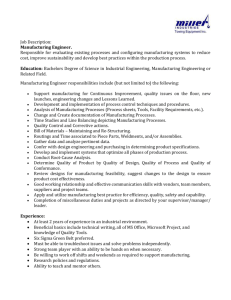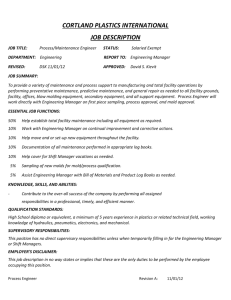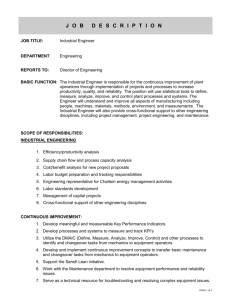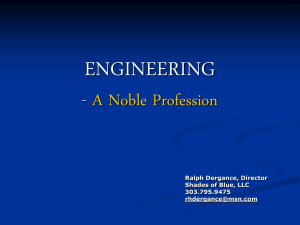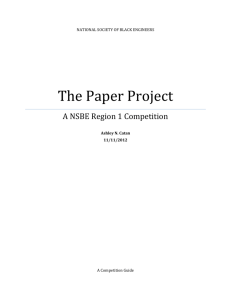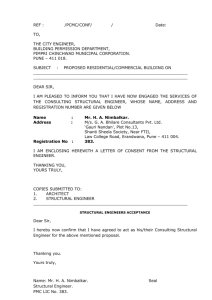Building engineering
advertisement
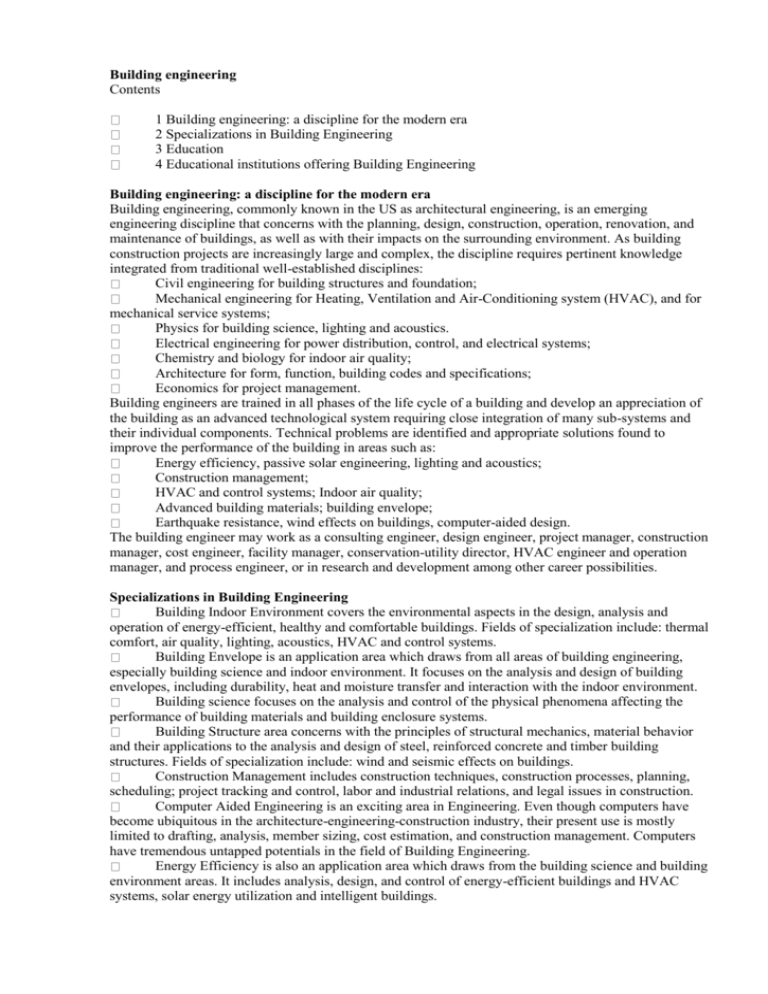
Building engineering Contents 1 Building engineering: a discipline for the modern era 2 Specializations in Building Engineering 3 Education 4 Educational institutions offering Building Engineering Building engineering: a discipline for the modern era Building engineering, commonly known in the US as architectural engineering, is an emerging engineering discipline that concerns with the planning, design, construction, operation, renovation, and maintenance of buildings, as well as with their impacts on the surrounding environment. As building construction projects are increasingly large and complex, the discipline requires pertinent knowledge integrated from traditional well-established disciplines: Civil engineering for building structures and foundation; Mechanical engineering for Heating, Ventilation and Air-Conditioning system (HVAC), and for mechanical service systems; Physics for building science, lighting and acoustics. Electrical engineering for power distribution, control, and electrical systems; Chemistry and biology for indoor air quality; Architecture for form, function, building codes and specifications; Economics for project management. Building engineers are trained in all phases of the life cycle of a building and develop an appreciation of the building as an advanced technological system requiring close integration of many sub-systems and their individual components. Technical problems are identified and appropriate solutions found to improve the performance of the building in areas such as: Energy efficiency, passive solar engineering, lighting and acoustics; Construction management; HVAC and control systems; Indoor air quality; Advanced building materials; building envelope; Earthquake resistance, wind effects on buildings, computer-aided design. The building engineer may work as a consulting engineer, design engineer, project manager, construction manager, cost engineer, facility manager, conservation-utility director, HVAC engineer and operation manager, and process engineer, or in research and development among other career possibilities. Specializations in Building Engineering Building Indoor Environment covers the environmental aspects in the design, analysis and operation of energy-efficient, healthy and comfortable buildings. Fields of specialization include: thermal comfort, air quality, lighting, acoustics, HVAC and control systems. Building Envelope is an application area which draws from all areas of building engineering, especially building science and indoor environment. It focuses on the analysis and design of building envelopes, including durability, heat and moisture transfer and interaction with the indoor environment. Building science focuses on the analysis and control of the physical phenomena affecting the performance of building materials and building enclosure systems. Building Structure area concerns with the principles of structural mechanics, material behavior and their applications to the analysis and design of steel, reinforced concrete and timber building structures. Fields of specialization include: wind and seismic effects on buildings. Construction Management includes construction techniques, construction processes, planning, scheduling; project tracking and control, labor and industrial relations, and legal issues in construction. Computer Aided Engineering is an exciting area in Engineering. Even though computers have become ubiquitous in the architecture-engineering-construction industry, their present use is mostly limited to drafting, analysis, member sizing, cost estimation, and construction management. Computers have tremendous untapped potentials in the field of Building Engineering. Energy Efficiency is also an application area which draws from the building science and building environment areas. It includes analysis, design, and control of energy-efficient buildings and HVAC systems, solar energy utilization and intelligent buildings. Education Building engineers would normally have an accredited academic degree with a concentration in building engineering from a recognized university. The completed degree may be designated as a Bachelor of Engineering, Bachelor of Science or Bachelor of Applied Science depending upon the university. The length of study is between three to four years and the program consists of basics of engineering and sciences (technical drawing, engineering mechanics, mechanics of materials, thermodynamics, mathematics, computer programming, surveying), subjects in building engineering sciences (structural analysis and design, soil mechanics, building engineering systems, the aural and visual environment, building envelope design, building economics, construction management, thermal environment and building service systems). Elective courses towards the end of the program allow students to specialize in one or more sub-disciplines. Some building engineers may wish to pursue a postgraduate degree such as a Master of Engineering, an Engineer's degree, or a Doctor of Philosophy in Engineering. The Master and Engineer's degree may consist of either research, coursework or a mixture of the two. The Doctor of Philosophy consists of a significant research component and is often viewed as the entry point to academia.

